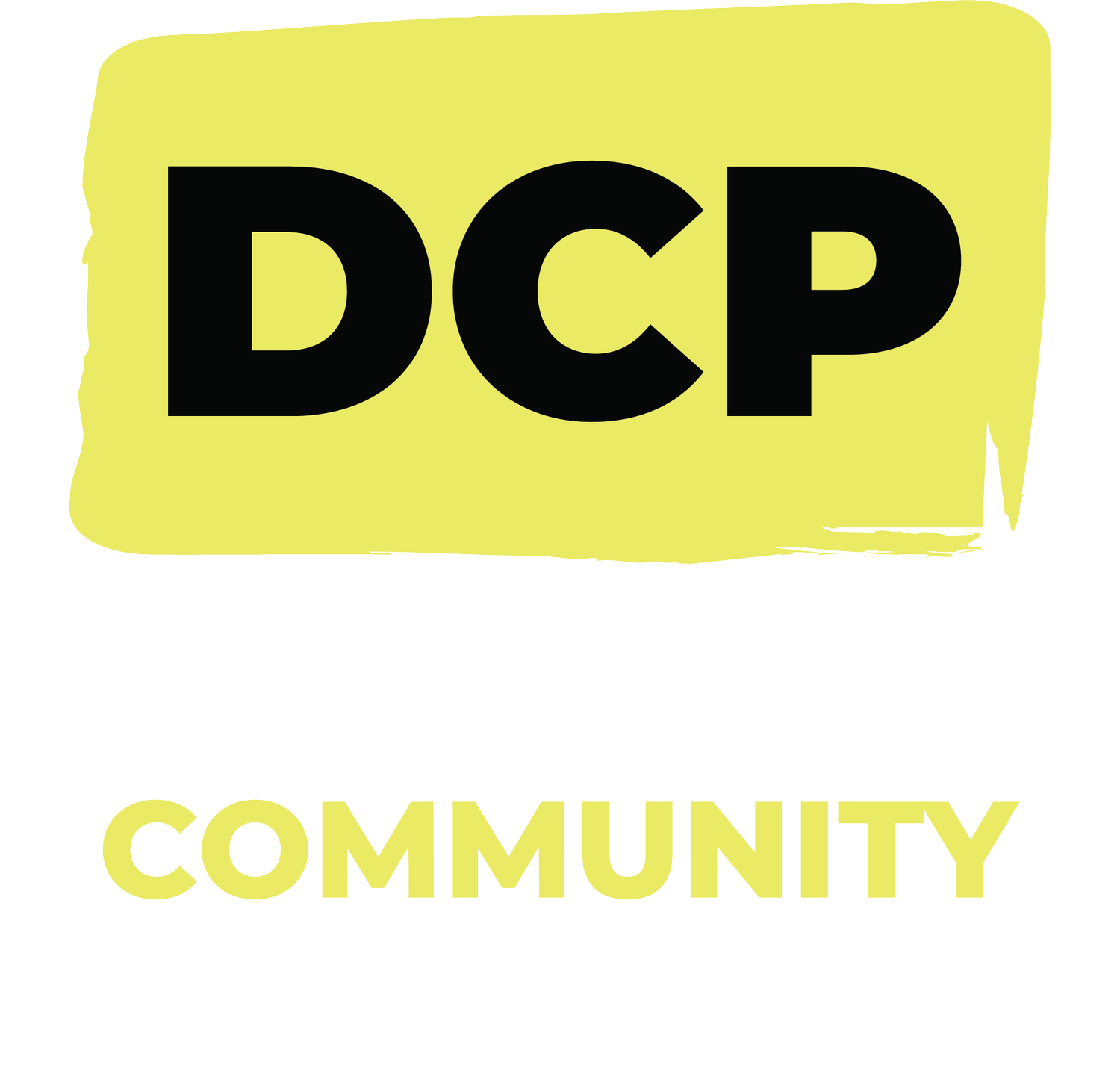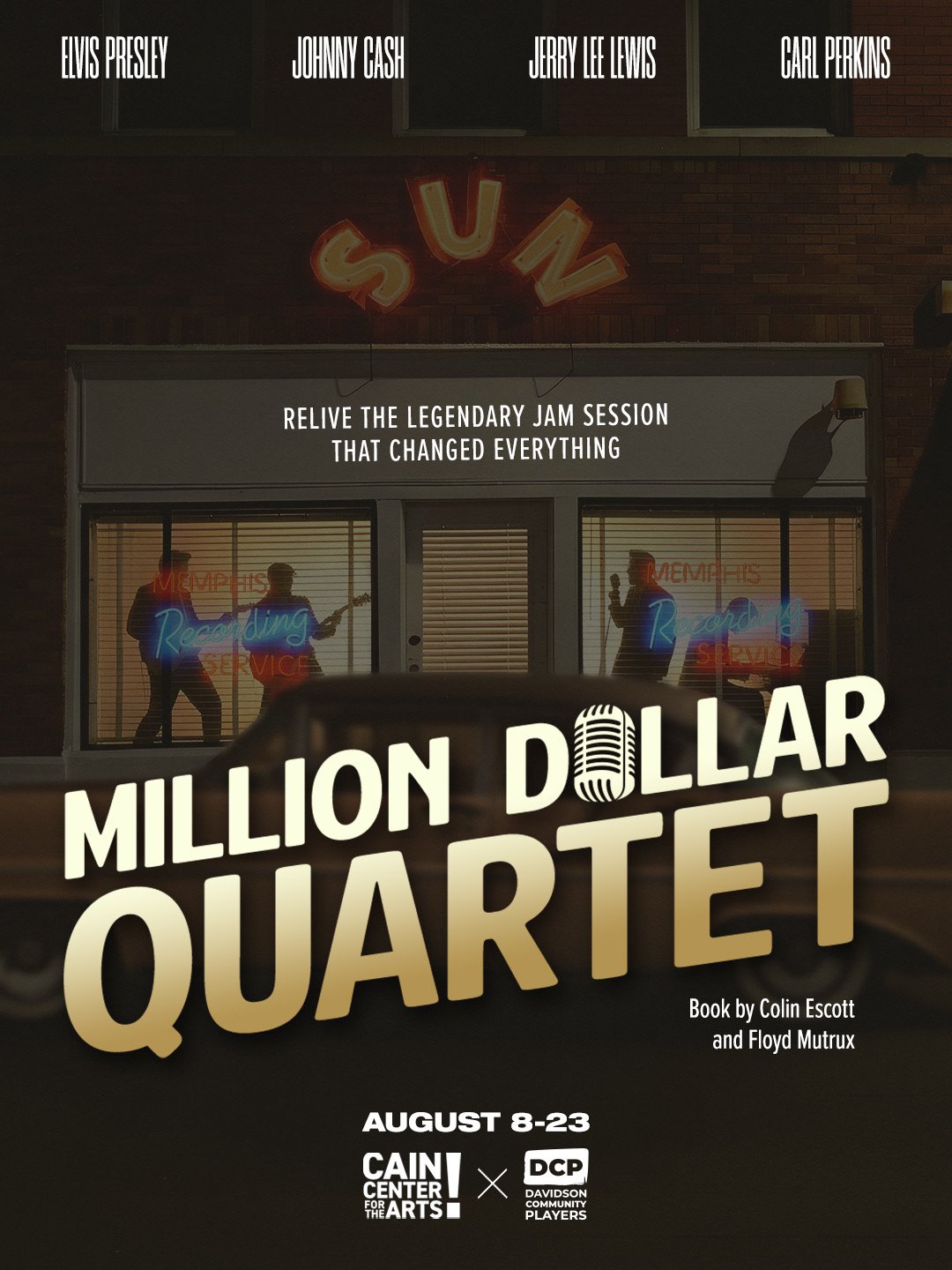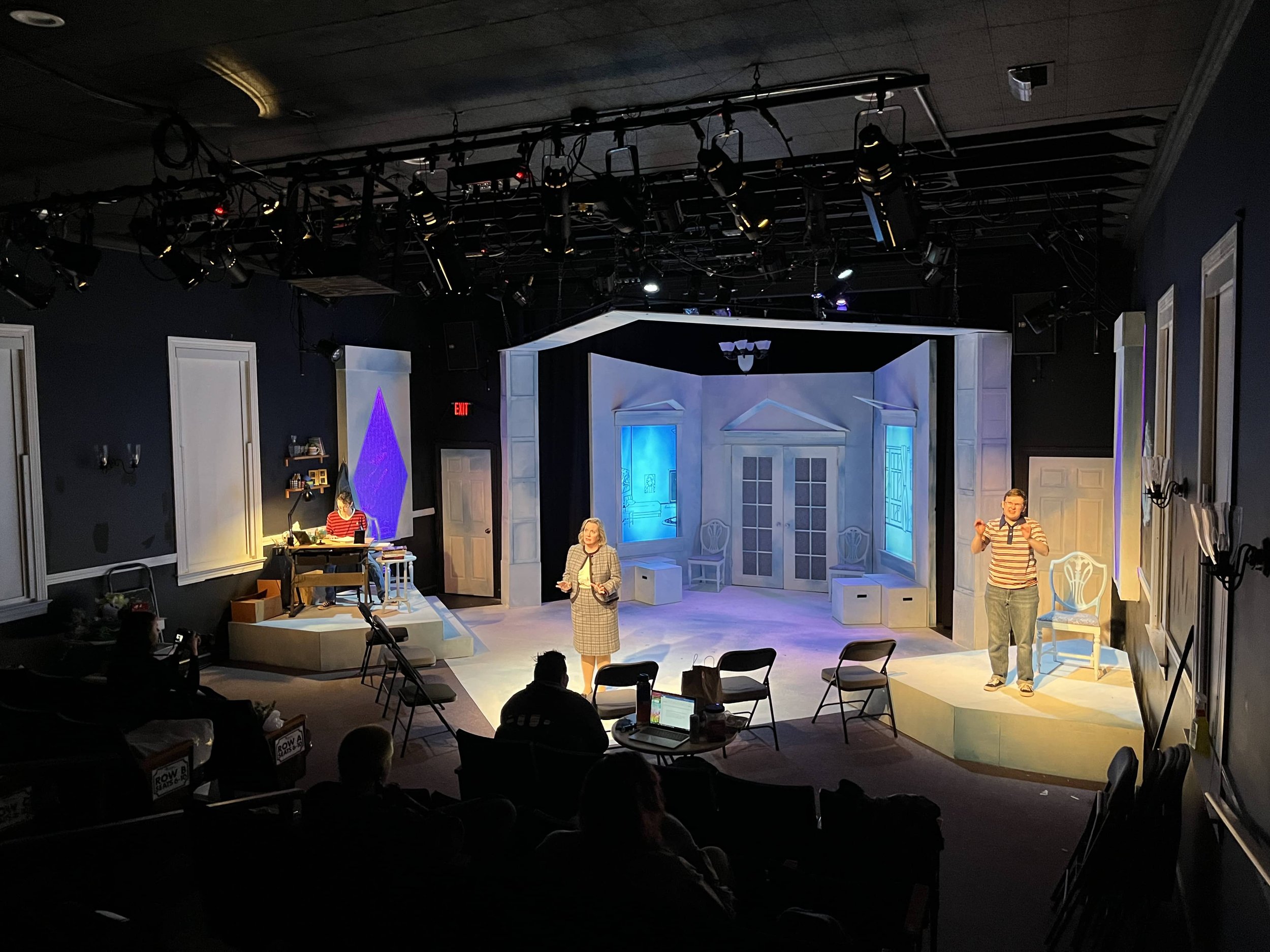
Audition Opportunities: See Yourself on the Stage
Current Audition Opportunities
MILLION DOLLAR QUARTET
by Colin Escott and Floyd Mutrux
-
Click here for submission instructions.
Auditions are open to both Equity and non-union performers, with a strong emphasis on showcasing local talent.
The first round of auditions will be by video submission only.
Deadline for video submissions is March 13.
In-person callbacks are tentatively scheduled for March 29.
-
Million Dollar Quartet is a unique co-production presented by Cain Center for the Arts and Davidson Community Players.
All performances will take place at Cain Center for the Arts in Cornelius.
This production will be directed by Scott Albert.
Rehearsals will tentatively begin July 13. Exact rehearsal schedule will be contingent on cast availability.
Performances will be August 8-23.
Both DCP and the Cain are placing a strong emphasis on showcasing local talent, but all performers are welcome to submit.
Compensation for non-union performers will begin at $2000. Limited AEA guest contracts available.
-
All characters represent the real people who were present at this historical recording, but any entertainer who feel they can embody these characters is encouraged to submit an audition. All music is to be played live by these performers, so please note the instrumental needs for each role.
Elvis Presley (he/him)
Vocal range: Baritone/Tenor (A-flat2 to C5)
Instrument: Guitar
Age: Early 20s
Character type: Charismatic, confident, and already a star
Personality: Charming, humble, yet aware of his fame; nostalgic for his Sun Records roots but itching to move forward.
Notes: Requires strong vocal impersonation skills for Elvis’s signature tone and vocal mannerisms, plus strong guitar ability and movement reminiscent of his style.Johnny Cash (he/him)
Vocal range: Bass/Baritone (E2 to G4)
Instrument: Guitar
Age: Mid-20s
Character type: Quiet, brooding, authentic country soul
Personality: Thoughtful and reserved with a magnetic presence; balancing loyalty to Sun with ambitions for a bigger future.
Notes: Should have solid guitar skills and a deep, distinctive voice capturing Cash’s iconic timbre and phrasing.Jerry Lee Lewis (he/him)
Vocal range: Tenor (A2 to C5)
Instrument: Piano
Age: Early 20s (youngest of the group)
Character type: Explosive, cocky, hilariously brash
Personality: Wild energy; confident in his talent and not afraid to steal the spotlight; the comic relief and unpredictable spark.
Notes: Must be an exceptional rock-and-roll pianist with authentic Jerry Lee-style technique — big energy, comic timing, and physical stamina.Carl Perkins (he/him)
Vocal range: Tenor/Baritone (C3 to A4)
Instrument: Guitar
Age: Mid-20s
Character type: Hardworking, slightly bitter, skilled musician
Personality: Feels overshadowed by Elvis’s success; driven to reclaim recognition for his songwriting and guitar prowess.
Notes: Virtuoso guitar player; skilled vocalist with rockabilly grit; emotionally grounded.Sam Phillips (he/him)
Vocal range: Spoken role (may include some light singing/harmonizing)
Age: Mid-30s to 40s
Character type: Visionary record producer, father figure
Personality: Passionate about music; intelligent, paternal, and business-minded; aware of the changing tides in the music industry.
Notes: The “anchor” of the piece, narrating and driving the dramatic arc; strong actor with storytelling ability. Sam’s southern accent is an important part of his character. You can hear an interview with the real Sam Phillips HEREDyanne (she/her)
Vocal range: Mezzo-Soprano/Alto (A3 to E5)
Age: Early 20s
Character type: Elvis’s girlfriend (loosely inspired by Marilyn Evans)
Personality: Confident, smart, with warmth and sensuality; provides a female presence in an all-male world.
Notes: Sings classic hits in her own style; strong singer comfortable with rock, blues, and jazz styles; some movement ability.Brother Jay (he/him)
(Jay Perkins — Carl Perkins’ brother)
Vocal range: Baritone (minimal singing)
Instrument: Upright bass
Age: Mid–20s to 30s
Description:
Laid‑back, cool, and steady — the backbone of the rockabilly rhythm section. Often dry-humored or understated, he lets the others take the spotlight while keeping the band locked in rhythmically. Strong upright bass slapping technique required.Flack (W.S. “Fluke” Holland) (he/him)
Instrument: Drums
Age: 20s–30s
Description:
Perkins’ drummer and one of the earliest rockabilly drummers. Easygoing, skilled, and rhythm-focused. Needs excellent timing, the ability to drive high-energy numbers, and a good sense of teamwork. Usually has minimal dialogue but an important musical presence. -
Million Dollar Quartet is a jukebox musical inspired by the legendary, real-life recording session that took place on December 4, 1956, at Sun Records in Memphis. That day, four young artists who would become icons—Elvis Presley, Johnny Cash, Jerry Lee Lewis, and Carl Perkins—unexpectedly came together for what would be one of the most famous jam sessions in music history.
The story is told through the eyes of Sam Phillips, the founder of Sun Records and the man who discovered each of the four musicians. As he narrates, the show explores the early days of rock ’n’ roll, the relationships between the artists, and Phillips’s role in shaping their careers.
When Carl Perkins arrives at Sun Records to record new material—accompanied by his brother Jay on bass and drummer Fluke (Flack) Holland—Phillips surprises him by pairing him with an energetic, unknown piano player named Jerry Lee Lewis, whose wild behavior instantly creates both tension and comedy.
The session becomes more unexpected when Elvis Presley stops by with his girlfriend Dyanne, followed shortly by Johnny Cash. As the four musicians begin to talk, play, compete, reminisce, and reveal career challenges, their individual crossroads become clear:
Elvis feels torn between Hollywood and his musical roots.
Johnny Cash is ready to break news to Sam that will change their relationship.
Carl Perkins struggles with being overshadowed after "Blue Suede Shoes" became Elvis’s hit.
Jerry Lee Lewis wants to prove he belongs among them, even if he drives everyone crazy.
And Sam Phillips faces the possibility of losing the artists he helped build.
Through classic songs performed live onstage, the musical recreates the energy, humor, conflict, and camaraderie of the only night these legends ever recorded together. By the finale, the show transforms into a full-throttle rock concert celebrating the birth of rock ’n’ roll and the legacy of the artists who shaped it.
-
Click here for SUBMISSION INSTRUCTIONS.
When ready, click here to SUBMIT.
If you have questions, please contact Production Manager Carrie Cranford at carrie@davidsoncommunityplayers.org
ROCK OF AGES
Book by Chris D’Arienzo
Arrangements and Orchestrations by Ethan Popp
Director and Choreographer Hannah Shizuko and Musical Director Vicki Harvell will be casting 20-25 of the region's most talented rock performers and dancers between the ages of 16-24. The TS3 summer experience is a musical theatre intensive designed to give teens and young adults an experience that mirrors the intensity of a traditional summer stock schedule.
-
The first round of auditions for ROCK OF AGES will be by video submission only. Please register at the link below and video submission instructions will be sent to you via email by March 6.
Deadline for those submissions will be April 1.
(In-person callbacks are scheduled for May 16 & 17. )
-
Rehearsals will begin July 13 with performances July 28 - August 1.
In-person callbacks are scheduled for May 16 & 17.
All performances will take place at the Cain Center for the Arts in Cornelius.
TS3 productions are a product of our Education Department, intended to be an opportunity for instruction and growth in a safe and supportive environment. There is a participation fee of $350 for leads and $300 for Ensemble. We have opportunities for financial assistance and you will find information about that process on your audition registration form. It’s our goal that theatre be as accessible as possible.
**Please be aware that ROCK OF AGES does contain alcohol use, references recreational drug use, and implies sexual activity.**
-
Available to performers ages 16-24 only.
Roles are available for strong pop/rock vocalists who can rock us like a hurricane! (Descriptive pronouns from the text are included for each character, but the portrayal is not definitive and all actors are encouraged to audition for any role which they feel they can fully embody.)
Lonny: (he/him) Vocal range: D3-D5 The narrator. Mischievous and charming. Strong comedic timing/improv skills, and strong rock vocals.
Drew: (he/him) Vocal range: Db3-D5. An aspiring rock singer stuck working as a janitor at the Bourbon Room, dreaming of his big break. Earnest, sweet, and slightly naïve.
Sherrie: (she/her) Vocal range: G3-F5. A wide-eyed small-town girl from Kansas who arrives in Hollywood chasing dreams of a better life. Hopeful, romantic, and idealistic.
Dennis: (he/him) Vocal range: D3-G4. A laid back, easy going dude… until his bar is threatened! Loyal, passionate, and resistant to change.
Stacee Jaxx: (he/him) Vocal range: C3-Eb5 The ultimate rocker. Wildly confident and utterly out of control.
Justice: (she/her) Black woman. Vocal Range: G3-Db5. A wise and commanding woman who runs the Venus Club and becomes a mentor figure to Sherrie.
Hertz Klinemann: (he/him) Vocal Range: F3-G#4. They are the “villain”. Strong character actor. German accent.
Franz Klinemann: (he/him) Vocal Range: Db3-E5. Initially awkward and reserved,but unexpectedly discovers his own identity and freedom through rock ’n’ roll. Strong falsetto. German accent.
Regina: (she/her) Vocal Range: A3-Eb5. A hilarious, tree-hugging fighter who will stop at nothing to protect the Sunset Strip.
Ensemble: Looking for a diverse crew to portray the various supporting roles of Mayor, Ja’Keith Gill, Joey Primo, rockers, groupies, bartenders, activists, club patrons, journalists, and larger-than-life personalities that populate the Strip.
-
We will follow up with video submission instructions by March 6. If you don’t receive this info by the deadline, please reach out to Production Manager Carrie Cranford at carrie@davidsoncommunityplayers.org
AUDITION WITH DCP
Join Us On Stage
DCP is a place where you in the audience can also have the chance to be on stage. Acting with DCP is largely volunteer-based, though financial assistance and actor stipends may be available depending on the show’s needs.
About Auditioning
DCP encourages everyone to audition for a show regardless of your acting experience. We want you to feel comfortable at auditions, and we strive to make this a rewarding experience for everyone.
In order to provide you with the best audition experience possible, we have compiled a few helpful hints and bits of information about the audition and rehearsal process.
-
Read over the audition notice thoroughly. The audition information will provide details about character description, audition requirements, and general information about the rehearsal schedule.
Read the script and/or research the play. For non-musicals, directors generally ask for cold readings from sides, which are scene selections from the script, so familiarity with the script is certainly beneficial.
If you are auditioning for a musical, you will be asked to perform a song of your choice as well as participating in a group dance audition. You will need to provide sheet music for the accompanist at the audition. Choose a song that showcases your voice. Read the audition notice carefully to see if there is a particular style of song requested by the director. DCP offers musical theatre audition workshops, which are a great way to prepare for auditions!
Update your resume and headshot. Your resume should include your theatre and/or performance experience, if any. If you have special skills or training that is relevant to theatre, please list on the resume. Your headshot does not need to be professional; however, it is suggested that it be a recent photograph.
Pre-register for the audition if instructed to do so.
-
Depending on the director, auditions may be run by appointment or as large group blocks.
For a non-musical, you will be asked to do cold readings with others who are auditioning.
For musicals, you will be asked to perform your musical selection and then learn and present a dance sequence. The director may ask you to do a cold reading as well.
If you are auditioning for a Connie Company production, you may be asked to participate in theatre games and improvisations.
-
Some directors will schedule a “callback,” or second round of auditions. You will be notified by phone or email if you have been invited to a callback. Being called back does not mean you are cast in the production and likewise NOT being called back doesn’t mean that you are NOT cast in the production.
Casting the show is the responsibility of the director and, in the case of a musical, the music director.
Casting offers will be made by phone or email. After the cast is confirmed, the cast list will be posted publicly. DCP will send out notices to those who are not cast via email.
-
Rehearsal schedules are variable, and we try to alternate schedules to provide accessible options to folks with all sorts of work and personal commitments. In general, plays rehearse 6 weeks and musicals 8-10 weeks. The director and stage manager will provide a rehearsal schedule ASAP following casting.
Actors are expected to disclose all conflicts prior to casting. No conflicts will be honored during tech week or performance weeks.
-
For both professional and amateur actors, the results of an audition are largely out of your control. Directors must balance countless factors before defining a cast, and the strength of your audition is only one element.
So, do your best, have fun, and if you aren’t cast, don’t be discouraged. Come back next time!
NON-DISCRIMINATION POLICY:
All roles, unless otherwise announced, are open. DCP encourages anyone who is interested to audition and we are always eager to welcome new faces and fresh talent to our stage. Except as specifically required by the playwright for certain roles, DCP provides equal opportunity to all individuals regardless of race, color, religion, gender identity or expression, sexual orientation, age, disability, or any other characteristic protected by law.



